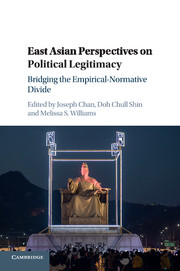Book contents
- Frontmatter
- Contents
- List of Contributors
- Preface and Acknowledgments
- 1 Political Legitimacy in East Asia: Bridging Normative and Empirical Analysis
- 2 Reasons to Obey: “Multiple Modernities” and Constructions of Political Legitimacy
- 3 Do East Asian States Enjoy a Legitimacy Premium?
- 4 Political Legitimacy in China: A Confucian Approach
- 5 Political Legitimacy in Hong Kong: A Hybrid Notion
- 6 The Evolution of Political Legitimacy in Singapore: Electoral Institutions, Governmental Performance, Moral Authority, and Meritocracy
- 7 Polarized Politics, Government Legitimacy, and Democratic Legitimacy in Taiwan
- 8 The Legitimacy of Democratic Rule in Korea: From the Perspective of the Mass Citizenry
- 9 Political Legitimacy, Satisfaction, and Japanese Democracy
- 10 Legitimacy as a Hybrid Phenomenon
- Index
4 - Political Legitimacy in China: A Confucian Approach
Published online by Cambridge University Press: 30 December 2016
- Frontmatter
- Contents
- List of Contributors
- Preface and Acknowledgments
- 1 Political Legitimacy in East Asia: Bridging Normative and Empirical Analysis
- 2 Reasons to Obey: “Multiple Modernities” and Constructions of Political Legitimacy
- 3 Do East Asian States Enjoy a Legitimacy Premium?
- 4 Political Legitimacy in China: A Confucian Approach
- 5 Political Legitimacy in Hong Kong: A Hybrid Notion
- 6 The Evolution of Political Legitimacy in Singapore: Electoral Institutions, Governmental Performance, Moral Authority, and Meritocracy
- 7 Polarized Politics, Government Legitimacy, and Democratic Legitimacy in Taiwan
- 8 The Legitimacy of Democratic Rule in Korea: From the Perspective of the Mass Citizenry
- 9 Political Legitimacy, Satisfaction, and Japanese Democracy
- 10 Legitimacy as a Hybrid Phenomenon
- Index
Summary
INTRODUCTION
Political legitimacy, according to Jean-Marc Coicaud, “is defined as the governed recognizing the right of the governors to lead and, to a certain extent, their entitlement to the perks of power.” Put simply, a government is legitimate when it is morally justified in the eyes of the people. It is not easy to measure legitimacy: do we use qualitative interviews with people from different social groups, survey data, or elections? And what counts as legitimate: the views of educated people or a majority of the people, or does everybody have to agree? What is clearer, perhaps, is when the governors lack legitimacy: they are overthrown in a revolution or must use brutal violence to put down popular uprisings. In fact, as Philippe Schmitter points out:
Legitimacy usually enters the analytical picture when it is missing or deficient. Only when a regime is being manifestly challenged by its citizens/subjects/beneficiaries do political scientists tend to invoke legitimacy as a cause for the crisis. When it is functioning well, legitimacy recedes into the background. Persons take it for granted that the actions of their authorities are “proper,” “normal” or “justified.”
Prior to the Arab Spring, few political scientists were writing about the “legitimacy crisis” in the Middle East. But now that regimes have been toppled and the voices of the people have been heard, it seems clear that the rulers of several Middle Eastern countries lacked legitimacy and that the people preferred to be governed by democratically elected leaders.
In the case of China, the study of legitimacy took off in the early 1990s. Again, the reason is political: the Chinese Communist Party (CCP) rulers used extreme violence to put down a popular demand for change on June 4, 1989, and it seemed clear that a regime with legitimacy would not have resorted to such means. The more a regime is legitimate – that is, seen as morally justified in the eyes of the people – the less it has to rely on coercion to get its way. It also seemed clear – especially to Western analysts – that the regime was doomed.
- Type
- Chapter
- Information
- East Asian Perspectives on Political LegitimacyBridging the Empirical-Normative Divide, pp. 78 - 106Publisher: Cambridge University PressPrint publication year: 2016
- 5
- Cited by

